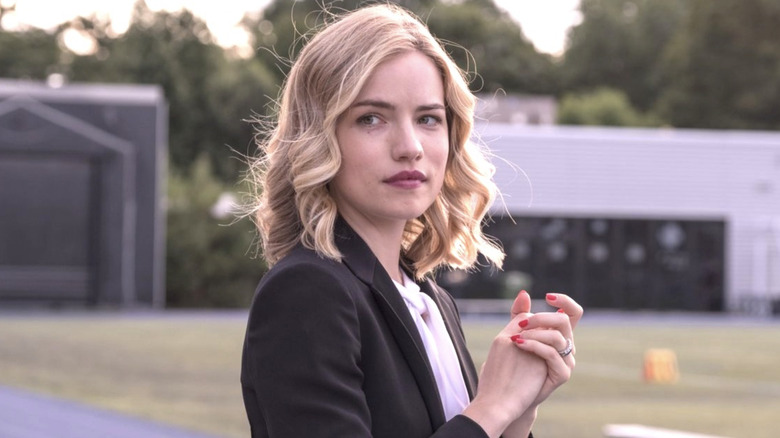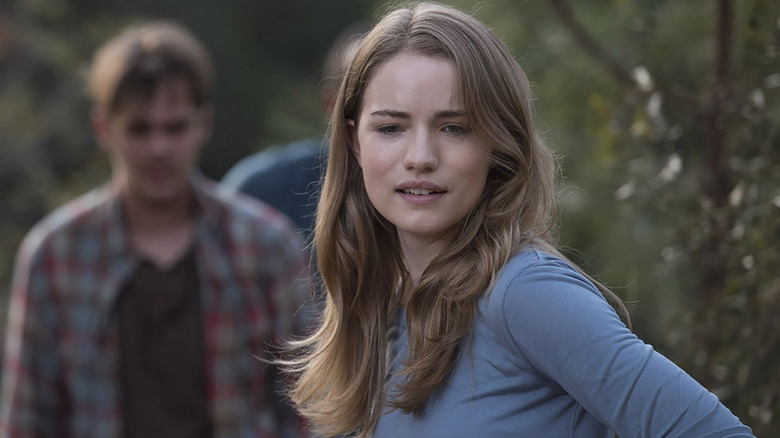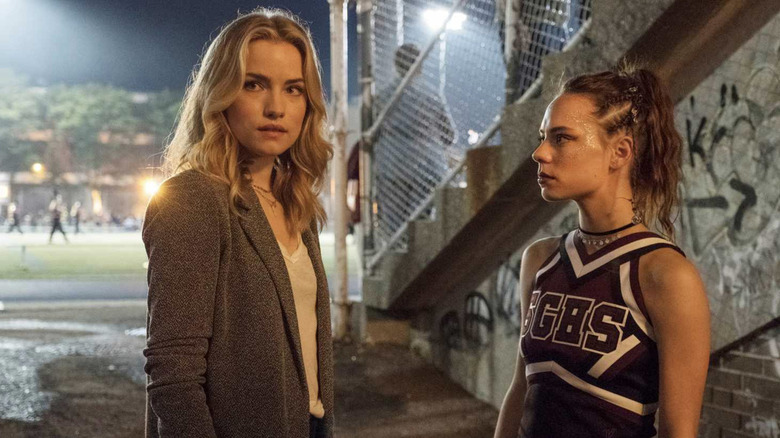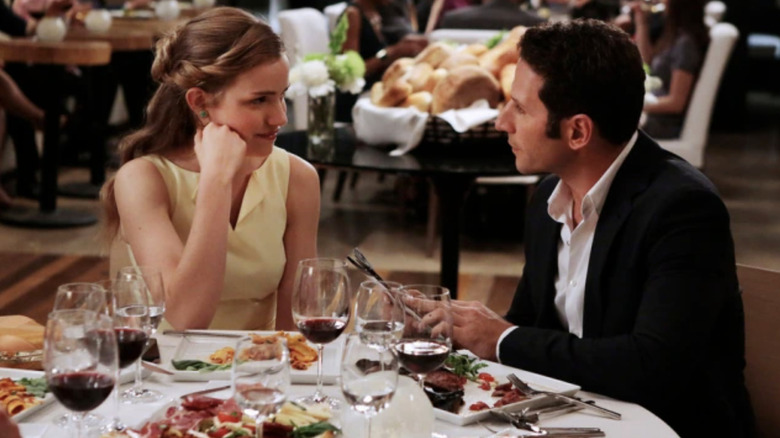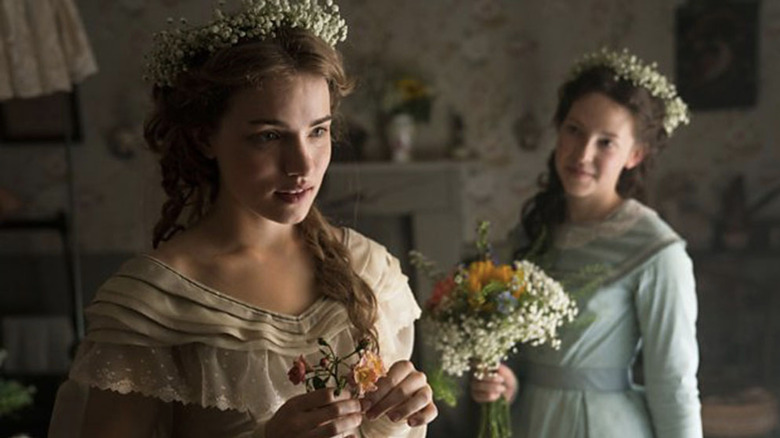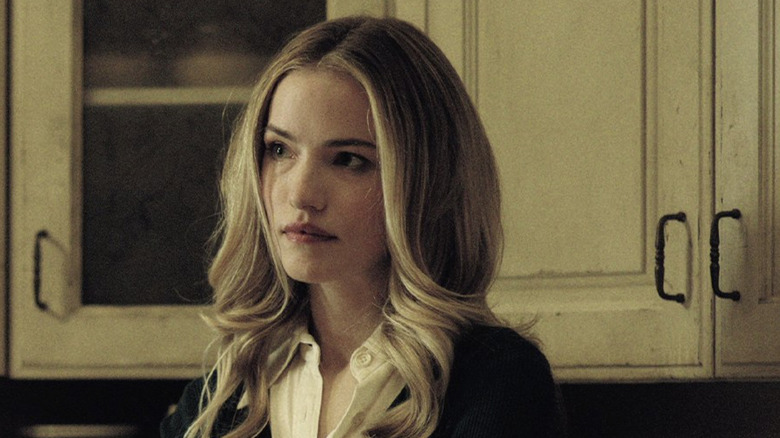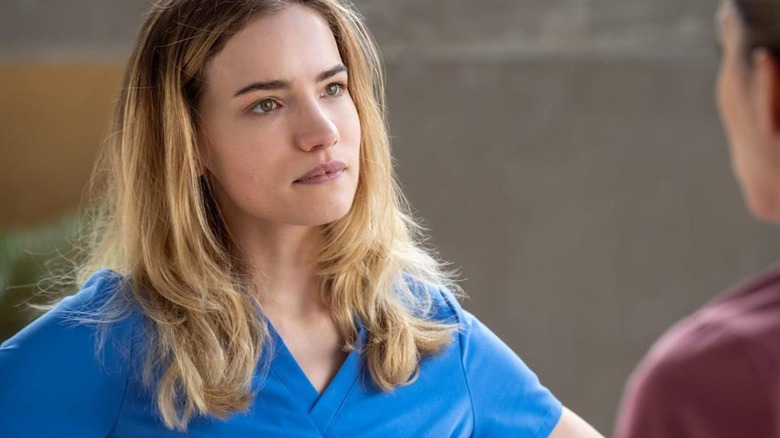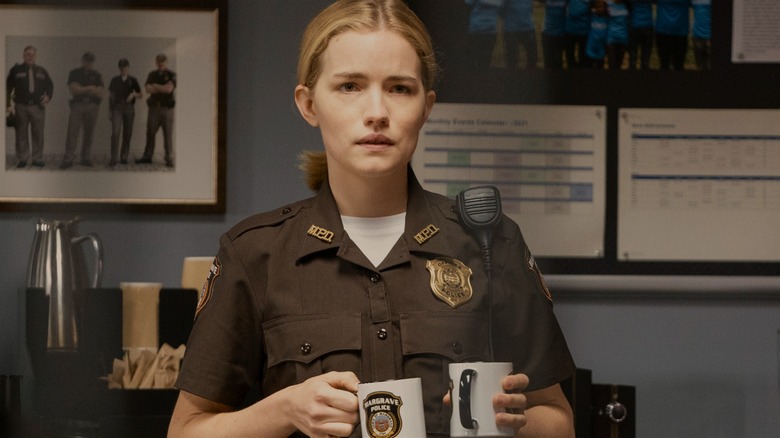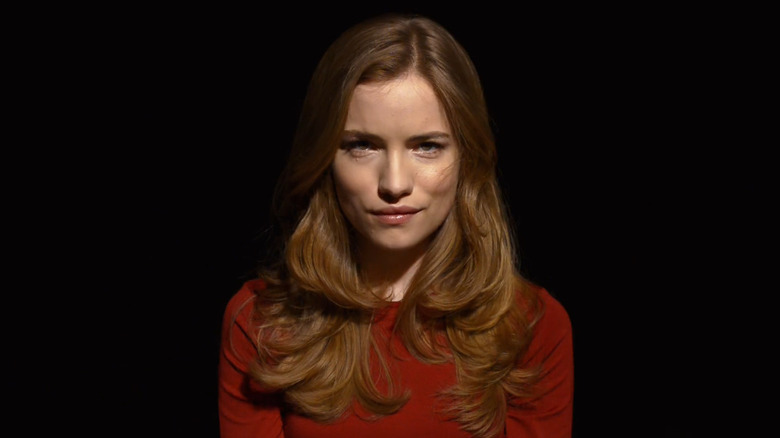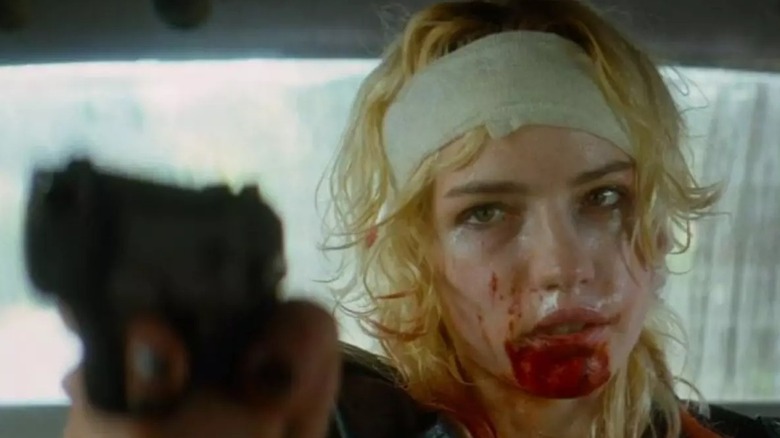9 Best Willa Fitzgerald Movies & TV Shows, Ranked
Willa Fitzgerald has been exploding in film and television fan favor in recent years thanks to a buzzy performance in a twisted thriller and the ever-growing popularity of everyone's favorite series about a beefy man taking down baddies. However, some folks inaccurately believe that Fitzgerald is a star on the rise when in reality, she's been consistently working since the late 2000s. She's established herself as a formidable acting presence with a proven track record of versatility, portraying complex characters across a miscellany of genres on screens big and small. Fitzgerald truly shines with her ability to draw audiences in and see the characters as very real people, regardless of the world in which the project is set. Even under the most heightened circumstances, she'll make you root for her as the final girl in a slasher series or strike fear into your heart as a sadistic killer. As she's continued to gain a dedicated following — slowly becoming one of those actors that audiences will tune into a project for just because she's a part of it — we're spotlighting her eight best roles, ranked.
9. Blood Money
The ingredients for an effective neo-noir are abundant at the outset of Lucky McKee's "Blood Money." The film centers on a trio of childhood friends – Victor (Ellar Coltrane), Jeff (Jacob Artist), and Lynn (Willa Fitzgerald) – who reunite for a weekend camping trip in the woods, but the vibes are off from the start. It quickly comes out that Victor and Lynn are clumsily concealing a romantic entanglement, which is an unwelcome development for Jeff, who still has feelings for Lynn. This tension is ramped up tenfold when Lynn and Victor discover three bags full of $100 bills. There's an easy way out here, but no one is thinking clearly. Further complicating matters is a fidgety drifter named Miller (John Cusack), who happens to be the rightful-wrongful owner of the cash.
"Blood Money" is a jaggedly written thriller that feels like it needed another pass or three from writers Jared Butler and Lars Norberg. McKee does his darndest to keep the story flowing, but the film winds up working best as a series of dar,k dramatic moments. Unsurprisingly, the most effective scenes all involve Fitzgerald's Lynn, a hard-charging athlete who seems far too smart and capable to be tethered to these two jealous buffoons. Lynn's character arc isn't clearly drawn, but Fitzgerld gets a few scenes where she browbeats the boys and asserts her intellectual superiority. This could've been a femme fatale's bloody journey to independence, but McKee is after something more ambiguous. Lynn is denied the ending she deserves, but Fitzgerald still wins out with a ferocious performance. (Jeremy Smith)
8. Dare Me
Definitely classified in the "canceled too soon" subgenre of TV shows, The USA Network teen thriller "Dare Me" is about a group of high school cheerleaders in the Midwest whose dynamic is permanently changed for the cutthroat when a new coach arrives to whip them into shape. The rivalry between two best frenemies on the become absolutely obsessed with coach Colette French (Willa Fitzgerald) and her quest for championship, and the girls' dedication to her and her mission serves as a catalyst to unleash the darkness brewing deep down within them. It's less intense than "Euphoria" and less campy than "Riverdale," almost acting like a bridge between the two worlds of teen drama.
Fitzgerald is particularly fantastic as Coach French, an enigmatic threat the girls can't help but want to impress despite the countless (and plentiful) red flags. An adaptation of the book of the same name by Megan Abbott, it's a shame that the series only lasted one season because it truly had the makings of being an addictive, good-time watch about some dangerously messy people. (BJ Colangelo)
7. Royal Pains
"Royal Pains" is one of those USA Network comedy shows from the 2010s that feels ripe to be rediscovered and repopularized any day now. The eight-season show centered on Dr. Hank Lawson (Mark Feuerstein) a man blacklisted by the medical community after he's blamed for the death of a hospital trustee, pivoting to the world of private medicine for the wealthy, famous, and infamous after saving the life of a party guest in the Hamptons. It's a solid scripted comedy with some genuinely silly moments and room for big character performances, but the core group of actors and returning stars is what helps keep it from going totally off the rails.
Willa Fitzgerald appeared as Emma Miller Lawson, the half-sister of Dr. Hank and his brother Evan (Paulo Costanzo), who learned how to be a con artist from her mother after being abandoned by their mutual father. Debuting in season 6, Fitzgerald's Emma brought a secretive element to the show and became a great source of drama in the lives of the Lawson brothers, who were starting to get a little too comfortable. While introducing a surprise sibling almost always generates some controversy with diehard fans (like on "Buffy the Vampire Slayer"), rewatches of "Royal Pains" removed from its initial airing have made plenty realize that Emma's inclusion was a great thing for the show. (BJ Colangelo)
6. Little Women
Louisa May Alcott's "Little Women" is an ever-endering story of the four March sisters — Meg, Jo, Beth, and the ever-complicated Amy — a coming-of-age story about a family of women doing what they can to survive while their father is away fighting for the Union in the Civil War, what it means to be a young woman in America, and an early look at challenging to the societal expectations of gender roles. The two-volume novel has been adapted many times, most notably in 1949, 1994, and 2019 for the big screen. However, there have been plenty of theatrical and made-for-TV adaptations as well, including a fantastic British miniseries from 2017 with a shockingly great cast.
A Christmas tradition for families across the globe, it's generally accepted that your "favorite" version of the sisters' stories will be heavily dictated by the women who play them. In this special, the cast boasts Maya Hawke as Jo March, Kathryn Newton as Amy March, Annes Elwy as Beth March, and Willa Fitzgerald as the eldest daughter, Meg March. The version is faithful to the original novel and each performer is firing on all cylinders, including Fitzgerald who manages to give Meg — the sister often neglected in favor of the juicer plotlines in most adaptations — arguably her best portrayal since Janet Leigh in 1949. (BJ Colangelo)
5. The Fall of the House of Usher
In Mike Flanagan's "The Fall of the House of Usher," the matriarch of that House is ice queen Madeline Usher. Willa Fitzgerald plays Madeline in the series' 1970s scenes, where she and her brother Roderick (Zach Gilford) are building their corporate empire.
Madeline is the ruthless brains of the operation and her brother's Lady Macbeth; she talks to him like a mother instructing a witless child in how to make her proud. Even having to crack a smile looks like it pains Madeline, and she cannot suffer fools or naivete. Just watch her "you've got to be kidding me" expressions around Roderick's ambitious wife, Annabel (Katie Parker). In episode 7, when in disbelief at Annabel's good heart, Madeline muses: "This is really you ... isn't it? I thought you only existed in the movies." Fitzgerald's delivery sounds so much like Mary McDonnell (who plays the elder Madeline).
This being a Flanagan production, Madeline's big moments are monologues, and in each one, Fitzgerald has to give her character the assuredness of a Bond villain, itself masking the fury of a woman snubbed too many times. As an actress, Fitzgerald finds her confidence in Madeline's own. Her character hates men having power over her, especially because she knows she's always the smartest one in the room. It's not so much that she wants to make sure everyone else knows that, more that she wants to crush any man who doesn't. (Devin Meenan)
4. Pulse
"Grey's Anatomy" lovers might be interested in "Pulse," Netflix's new medical procedural that focuses on Dr. Danny (Fitzgerald) and her competent peers, who must juggle the anxieties of their work with the mounting tensions of interpersonal dynamics. "Pulse" could have been a decently crafted genre offering that leans toward melodramatic shenanigans, but the series chooses to unravel as a borrowed mish-mash of tropes that fail to stick their landing. Well, there's good news: Fitzgerald is one of the few reasons why "Pulse" is worth watching, as her Danny is at the center of the chaotic mess of deep-seated traumas and unspoken anxieties. Even with a premise that doesn't quite know what it wants to be, Fitzgerald plays Danny with a measured complexity that the story denies her time and again.
The focal point of "Pulse" is not the ethical or emotional nuances of dealing with emergency cases at a hospital (although "The Pitt" seems to have that covered pretty well), but the romantic relationship between Danny and chief resident Xander Phillips (Colin Woodell). This is a tricky dynamic to navigate, as the show examines its erotic, toxic, and complicated facets, wherein the duo is in direct conflict at the beginning of the series. Fitzgerald does what she can with a character who is provided a convoluted backstory without tact or depth, managing to offer some semblance of value to a series that feels exhausting and aggravating to get through. (Debopriyaa Dutta)
3. Reacher
Lee Child's "Jack Reacher" novel series makes it clear that the titular protagonist isn't the kind to settle down for someone. An ex-military officer who talks with his fists, Reacher is a wandering spirit who does what he pleases. However, when Reacher (Alan Ritchson) crosses paths with Officer Roscoe Conklin (Fitzgerald) in the eponymous Prime Video adaptation, a visible shift occurs within him. Fitzgerald's Roscoe blazes into the scene with depth, charisma, and authenticity, sporting a likeable quick-wittedness that perfectly complements Reacher's deadpan humor. Over time, the usually closed-off Reacher ends up trusting Roscoe more than most people in Margrave, which rarely happens in the unpredictable world that Reacher inhabits.
Since Season 1, the series has followed the one-love-interest-per-season formula so far, but Roscoe's presence is keenly missed even in the most thrilling storylines. The reasons are multifold: Roscoe doesn't back down from a tough fight, she has the drive to fight for justice, and she never compromises her empathy for the toughness demanded by her job. What's more, Fitzgerald brings a sweet brand of sincerity to Roscoe, which disarms Reacher during a time when he needs genuine companionship. The fact that Child himself was devastated that Roscoe didn't return for Season 2 is proof enough that the character has left an indelible mark on the story. It is also not surprising that Reacher thinks that Roscoe is the only person who holds the power to tame his wandering spirit and tempt him to "stay close to the flame." (Debopriyaa Dutta)
2. Scream
Before "Fall of the House of Usher" or "Strange Darling," Willa Fitzgerald made her mark in the world of horror as the star of MTV's underrated "Scream" TV series. The three-season show ran from 2015 to 2019, and Fitzgerald appears in 23 of its 29 episodes — every single episode of the first two seasons.
With its serialized format and decision to abandon the Ghostface design in favor of the unnervingly humanoid Lakewood Slasher mask, the series adaptation of "Scream" had a lot to prove. Casting Fitzgerald in the leading role turned out to be a crucial piece of the puzzle. Her Emma Duval fills the Sidney Prescott (Neve Campbell) role as the central protagonist and the killer's main target, while still being very much her own character. The role requires Fitzgerald to start out as a good-natured but not exactly squeaky-clean person with a seriously bad family history before progressing to a justifiedly paranoid survivor who nevertheless manages to cling to her humanity. The actor clears both hurdles and all that's between with flying colors, and her believable portrayal allows the show around her to shine.
The first two seasons of "Scream" were able to take the franchise in some exciting new directions, and the true crime investigation angle the show embraced seemed to have potential for plenty more. However, "Scream" season 3 moved to VH1 and rebooted the show to the franchise's Ghostface roots. To say that the result was inferior to the Fitzgerald era would be a severe understatement. (Pauli Poisuo)
1. Strange Darling
Horror is historically a film genre where women can prove their mettle as actors; think of how stars like Jamie Lee Curtis and Sigourney Weaver started as scream queens. In 2024 erotic slasher "Strange Darling," Willa Fitzgerald plays a Lady — seemingly one of Laurie Strode's many descendants — that implores the audience to ask themselves about why they think women scream better than men.
"Strange Darling" uses a non-chronological story structure, and in that structure, it predicts what assumptions you'll make about scenes and the characters in them. To play her part right, Fitzgerald has to be terrified and terrifying, plus sexy, confident, vulnerable, teary-eyed, and yet resolute. Rarely all at once, but she does need to (and succeeds at) flipping without warning.
The Lady goes through some severe physical exertion during the movie, but Fitzgerald knows that her best-trained acting muscle is her face. The camera understands that too; some shots block out her full face because you only need to see parts of it to understand her. Even if your brain is telling you not to trust her, Fitzgerald's crying puppy dog "help me, please!" look will hook each time.
I haven't stopped thinking of her singing "Love Hurts" while sobbing, professing love and passion towards a man (Kyle Gallner) she's fighting for her life against. "Strange Darling" is a movie that only works with a two-faced lead — only an actress as expressive as Willa Fitzgerald could play that character so unforgettably. (Devin Meenan)
